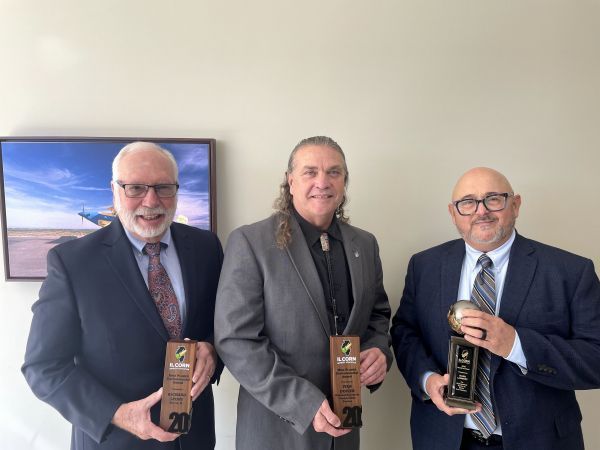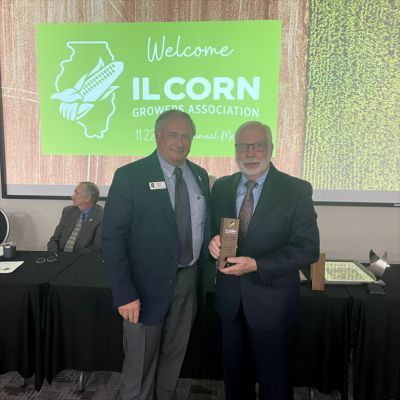ICGA Recognizes Lyons for Environmental Work

The IL Corn Growers Association (ICGA) recognized Richard “Dick” Lyons for his commitment to on-farm conservation during their annual meeting on November 22 at the Asmark AgriCenter in Bloomington, IL. Lyons was honored to receive the Mike Plumer Environmental Award, having known and worked with Mike Plumer for more than twenty years.
Lyons, a former agriculture instructor at LincolnLand Community College and Illinois State University, grows corn and soybeans in Montgomery County, Illinois. He accompanies these with a two year rotation of cereal rye and tillage radish, barley, rape, and Austrian winter pea to serve as cover crops during the winter. He strongly believes in utilizing soil health practices on his farm like cover crops and minimum tillage, as well as filter strips, two-stage ditch designs, and streambank stabilization to manage his fertilizer.
His commitment to conservation extends off the farm as well. Lyons currently serves as an associate director for the Montgomery County Soil and Water Conservation District, is a member of the IL Nutrient Loss Reduction Strategy Working Policy Group, serves on the Illinois Association of Drainage Districts Board of Directors, and is a member of the University of Illinois’ IL Water Survey advisory committee. Locally, Dick is a drainage commissioner in the two drainage districts where he farms and is a member of the Lake Lou Yaeger and Glenn Shoals Lake watershed committees in Montgomery County.
“Richard Lyons is a perfect example of why we give this award. He is doing everything right regarding conservation practices on his farm, and he’s willing to try something new and change or grow if he finds out there’s a practice that is better for his acres. He is committed to his land and water – which I hope all farmers are – and he puts that commitment into action not only by implementing conservation practices, but by stepping off the farm and leading other farmers by example,” said Marty Marr, President of the ICGA and farmer from New Berlin.

Lyons is the second award winner to receive the newly named Mike Plumer Environmental Award, after having learned from and worked with Plumer throughout his career. The two first met during a workshop for community college agriculture instructors at Rend Lake Community College during the 1990s. Plumer was presenting on the use of cover crops. This was the first time Lyons considered using cover crops for weed control and soil organic matter.
Later, Plumer asked Lyons to work as a cover crop specialist for the Illinois Council on Best Management Practices.
“Together, we planted cover crop plots and gave workshops on the use of cover crops. Unfortunately, Mike began to have some respiratory issues during the cover crop demonstration plots at the Farm Progress Show that year,” Lyons remembers.
“His knowledge and influence on me motivated me to use cover crops on my farm, up to 100 percent coverage by 2014, and to continue to champion their value on all Illinois farmland,” he said.
Pictured first above: Richard Lyons, Ivan Dozier, Mark Lambert
Pictured second: Marty Marr and Richard Lyons







